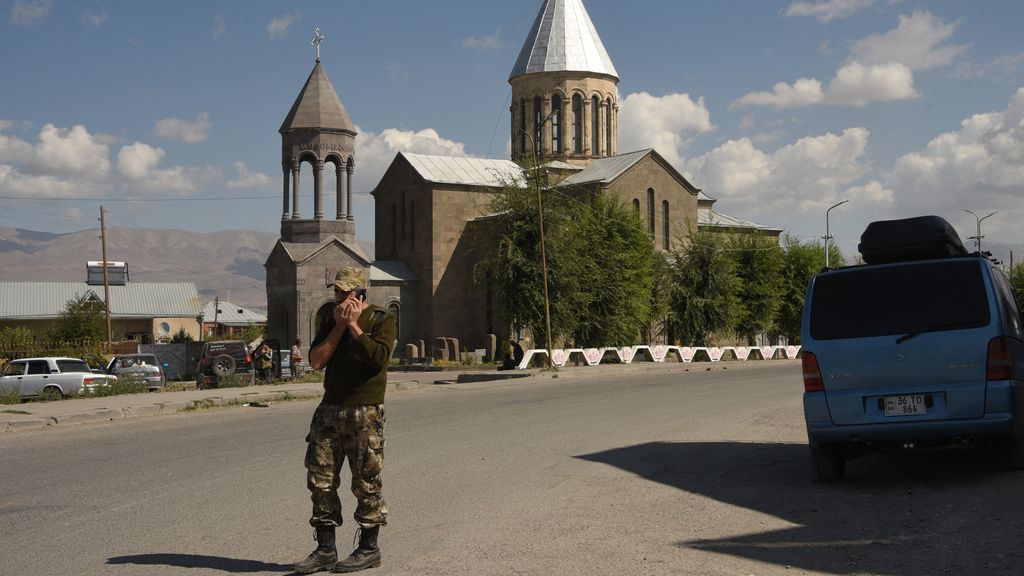Noos News•
-
Iris de Graaf and Chiem Baldock
Russia correspondent and foreign affairs editor from Armenia
-
Iris de Graaf and Chiem Baldock
Russia correspondent and foreign affairs editor from Armenia
Dozens of American soldiers begin military exercises in Armenia today. They train for ten days for peace operations.
This maneuver comes at a tense time: the relationship between Armenia and its ally Russia has witnessed a significant cooling recently. In addition, the relationship with the arch enemy and neighboring country Azerbaijan is experiencing extreme tension. Armenia accuses Azerbaijan of starving the Armenian population in Nagorno-Karabakh for nine months by closing the enclave.
Moreover, according to Armenia, Azerbaijan is rapidly building up military forces on the border, perhaps in preparation for a new offensive to take control of the enclave. Three Armenian soldiers were killed in a brief bombardment last week. It is also said that Armenians starved to death in Nagorno-Karabakh. On the contrary, Azerbaijan accuses Armenia of bombing Azerbaijani positions.
Armenia and Azerbaijan fought a bloody war in the 1990s over the Armenian enclave of Nagorno-Karabakh, which is internationally recognized as part of Azerbaijan, but ruled and inhabited by Armenians. After a six-week war in 2020, Azerbaijan seized areas around Nagorno-Karabakh and a settlement was reached for the enclave under Russia’s command.
From now on, Russian peacekeepers will guard the border, as well as the only road linking Armenia to Nagorno-Karabakh: the Lachin Corridor. This should ensure that Armenians do not lack anything.
Azerbaijan has been closing this road for nine months, according to authorities in the Azerbaijani capital, Baku, due to allegations that Armenians are smuggling weapons into the country. The result: a humanitarian crisis. The population of 120,000 people is isolated from the outside world and deprived of food and medicine. Baku wants to supply the enclave via a different, self-controlled route.
The Armenian and Karabakh authorities apparently agreed to this out of desperation this weekend, on the condition that the Lachin corridor would also be opened. An agreement was reached this weekend, but so far no transportation has reached the enclave. The fear in the Armenian capital Yerevan is that Azerbaijan will de facto control the enclave.
Russia is failing
Richard Giragosyan, director of the think tank’s Regional Studies Center in Yerevan, says Armenia feels betrayed by Russia. After the failed invasion of Ukraine, it became clear to Armenia that Russia’s great “power” was just a myth. As an ally, Russia is failing to protect the Armenian population: the number of Russian peacekeepers has declined since the war in Ukraine, and the focus in Moscow is not on the fragile situation in the Caucasus. Therefore, Armenia is looking for new allies.
Relying on Russia is a mistake.
The military maneuvers with the United States represent an important development in the geopolitical balancing act that Armenia is currently carrying out. “It involves a small number of troops and equipment, which makes it a relatively small exercise,” says Giragossian. “But it’s a clear step away from Moscow.”
And this is not the only move Yerevan has taken recently that is seen as a stab in the back in Moscow. Armenian Prime Minister Pashinyan said: Italian newspaper Unprecedentedly cruel to Moscow: the Russians will abandon Armenia, while Azerbaijan is busy with the “ethnic cleansing” of Nagorno-Karabakh. He added: “Our reliance on Russia is a big mistake.”
Moreover, Armenia sent humanitarian aid to Ukraine for the first time and Pashinyan’s wife attended the First Ladies Summit In Kyiv. Armenia also announced recognition of the International Criminal Court, which issued an arrest warrant against Putin, and pro-Russian bloggers were arrested in Armenia. In response to these developments, the Armenian ambassador was recalled to Moscow, where he was criticized for “many unfriendly steps”.
The European Union jumps into Russia’s gap
However, Giragosyan does not believe that the relationship with Moscow will completely deteriorate. According to him, Armenia operates in the survival mode of a small state: “Yerevan wants to expand the number of allies, from China and India to the European Union and the United States as well. To complement Russia, not as a substitute for it.”
Russia asserts that it still trusts the alliance with Armenia, but in Moscow they view Yerevan’s renewed Western friendships with suspicion, especially the military maneuvers with the arch-enemy America.
Giragossian believes that less reliance on Russia could help Armenia in the conflict with Azerbaijan. As a mediator, Russia always has its own interests on the table: Moscow wants to retain power in the Caucasus no matter what. Now filling the gap left by Russia is the European Union, which, according to Giragossian, can mediate independently and thus facilitate promising negotiations.
The fact remains that Armenia is militarily weak in the absence of Russian support, while the larger Azerbaijani army can count on unconditional Turkish support. Now that Russia is preoccupied with Ukraine, Azerbaijan could seize the opportunity to start a new war and annex the entire enclave. The temporary US military presence cannot prevent this, but perhaps diplomatic channels can do so. The only question is who will ultimately assume the role of mediator.

“Infuriatingly humble social media buff. Twitter advocate. Writer. Internet nerd.”








